Robotic Process Automation (RPA) has come to make a boom in the revolution of digital transformation, dissolving the working order of businesses in the year 2024. With companies eyeing newer ways of improving efficiency, reducing costs, and rich customer experience, RPA has become a key player. In this article, we will discuss robotic process automation cost and provide an RPA ROI analysis that will show key financial results, measure return on investment, and guide businesses in the right direction as they consider their automation strategies.
Let’s discuss the figures first. Deloitte and other reputable sources state that typically, small and medium enterprises (SMEs) will invest between $4,000 and $15,000 in a single bot. A large company, meanwhile, will spend as much as $20 million on an end-to-end RPA solution with as many as 500 robots. The depth at which such automation works can replace more than 1,000 employees, actualizing the saving of an excess of $100 million.
RPA is among the major drivers of digital transformation, so it’s no wonder big companies are ready to invest a fortune in such solutions. However, it is crucial to understand, “How much does robotic process automation cost?”.
Factors That Affect Robotic Process Automation Cost
To make this easier to understand the costs for robotic process automation, we can break it down into three categories:
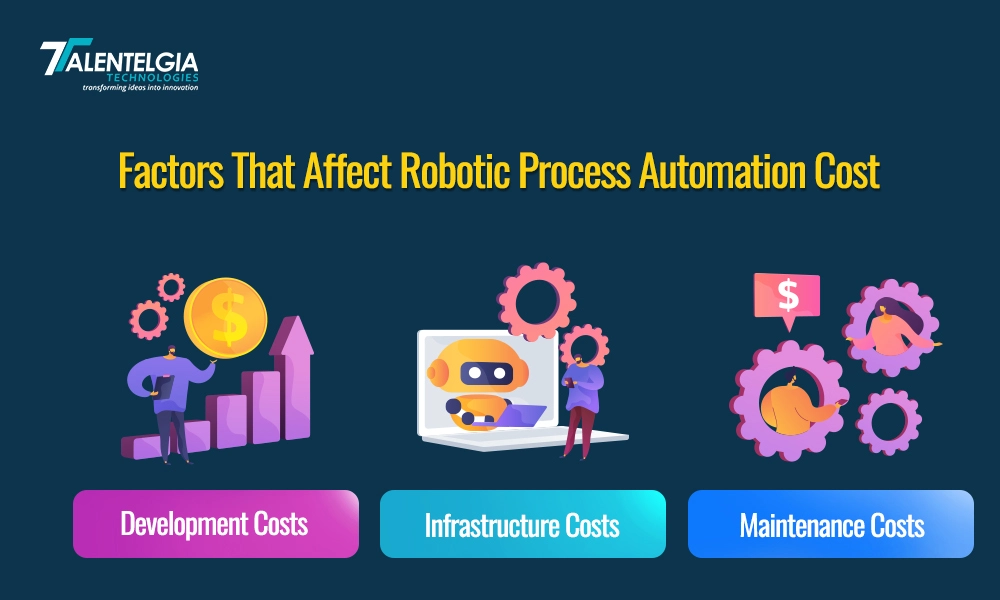
Development Costs
It’s quite difficult to quote a price for RPA use, as this will depend on process complexity, among other factors, and whether you outsource this service or do it yourself. The model would also vary with the size of the project, the technology applied, and the level of out-of-the-box customization your project requires. Perspective helps—these are significant points to be aware of when trying to gauge the size of your investment.
- Consultancy Cost: It is best to consult an RPA expert before starting to implement RPA. This session will help you realize how RPA can best be used in your organization, spot potential benefits, and develop a proper implementation plan. How much this consultation costs will be different with the doctor chosen and the level of complexity of your needs. Having expert guidance allows for a more efficient and successful RPA deployment.
- Training Costs: Training your existing staff in RPA development can leverage their familiarity with your organization’s unique processes. Training costs typically include enrolling employees in RPA development courses from vendors or third-party providers. This also involves costs for training materials, such as e-learning courses and software, and potentially hiring RPA trainers or instructors.
Transform Your
Business. Boost your growth with RPA solutions
delivered by our team of 150+ developers.
10+ years of experiece and trusted by
global clients across 20+ countries.
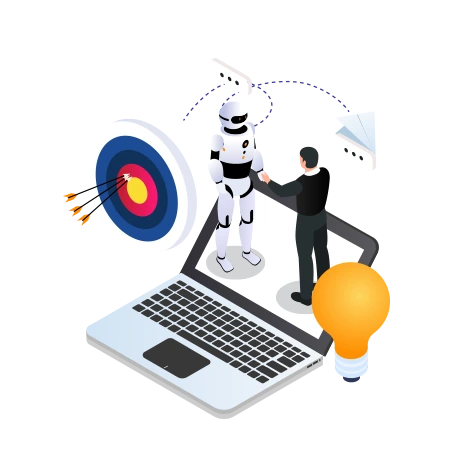
- Deployment Costs: Once RPA bots are ready to go live, there are additional costs for configuration, integration, and coordination with other systems:
- Configuration: Adapting bots for production, including setting parameters, access controls, and implementing security measures.
- Integration: Developing connectors, APIs, or scripts to enable smooth data exchange between RPA bots and other systems.
- Coordination: Integrating RPA activities with the overall business strategy will reduce costs for managers and partners.
- Operational Costs: It’s important to estimate the ongoing expenses for electricity, system monitoring, and any additional software licenses or tools required to manage and maintain your RPA environment effectively. These costs ensure the smooth running and oversight of your automated processes.
- Testing Costs: Testing is vital to ensure that the bots operate correctly and achieve the desired objectives. This includes costs for testing tools, creating test cases and scripts, and generating mock data to simulate real-world scenarios.
Infrastructure Costs
Before deploying RPA bots, consider the foundational elements needed for their operation. This includes the installation costs of services or virtual machines, licensing costs for RPA software, and the setup of servers, whether physical or virtual. These infrastructure investments are essential for a successful RPA implementation.
- Installation Costs for Services/Virtual Machines: RPA bots need computing resources to run. This includes costs for hosting services or virtual machines, such as cloud service fees, server maintenance, and data storage. This covers setting up the required infrastructure, whether physical servers or virtual machines, depending on your chosen model.
- Licensing Costs: These expenses cover the software licenses required for RPA tools and related technologies. Licenses typically depend on the number of bots or users and provide legal rights to use the RPA software. Costs vary depending on the size and scope of your RPA deployment.
- RPA Tools Cost: This consists of the direct cost of purchasing RPA software and tools. Pricing may vary depending on the specific RPA platform or tool selected and the licensing model used (such as a per-bot license or organization-wide license). These costs are crucial for budgeting and planning your RPA implementation.
Also Read: RPA vs AI
Maintenance Costs
Deploying RPA bots is just the beginning; the real work starts afterward. Organizations need to ensure their bots stay compatible with current technology and adapt to any new changes. This involves regular updates, performance monitoring, troubleshooting, and adjustments to maintain efficiency and effectiveness.
- Scalability and Expansion: As your organization grows, your business automation needs will also evolve. Extending and scaling the RPA infrastructure by purchasing more licenses for robotics, improving infrastructure, and integrating with other new systems and applications to meet new business requirements is now inevitable in the growing organization.
- Upgrades and Changes to Bots: You will also face the need to upgrade your RPA bots over time, as both your RPA software and business processes are changed. In this case, maintenance will include software, processes, and other changes that should be undertaken to keep the bots running efficiently.
| Cost Category | Description | Estimated Cost Range |
| Development Costs | Costs related to creating and customizing RPA bots. Factors include complexity and level of customization. | $4,000 – $15,000 per bot for SMEs; can reach up to $100,000 for large projects. |
| Consultancy Costs | Expert guidance for effective RPA implementation and strategy planning. | Varies widely; typically $1,000 – $10,000 depending on complexity. |
| Training Costs | Costs for enrolling employees in RPA development courses, training materials, and instructors. | $500 – $5,000 per employee or course. |
| Deployment Costs | Expenses for configuring, integrating, and coordinating RPA bots with other systems. | $2,000 – $20,000 depending on scope. |
| Operational Costs | Ongoing expenses for system monitoring, electricity, and additional software licenses. | $1,000 – $10,000 annually. |
| Testing Costs | Costs for tools, test cases, and mock data to ensure bot performance. | $1,000 – $5,000 depending on scope. |
| Infrastructure Costs | Includes installation of services or virtual machines, licensing costs, and server setup. | $10,000 – $50,000. |
| Licensing Costs | Software licenses for RPA tools, can vary based on the number of bots or users. | $5,000 – $50,000 annually. |
| RPA Tools Cost | Direct cost of purchasing RPA software and tools. | $10,000 – $100,000 depending on the platform and scale. |
| Maintenance Costs | Regular updates, performance monitoring, and scalability. | $10,000 – $30,000 annually. |
Also Read: How Much Does AI Cost?
RPA ROI Analysis
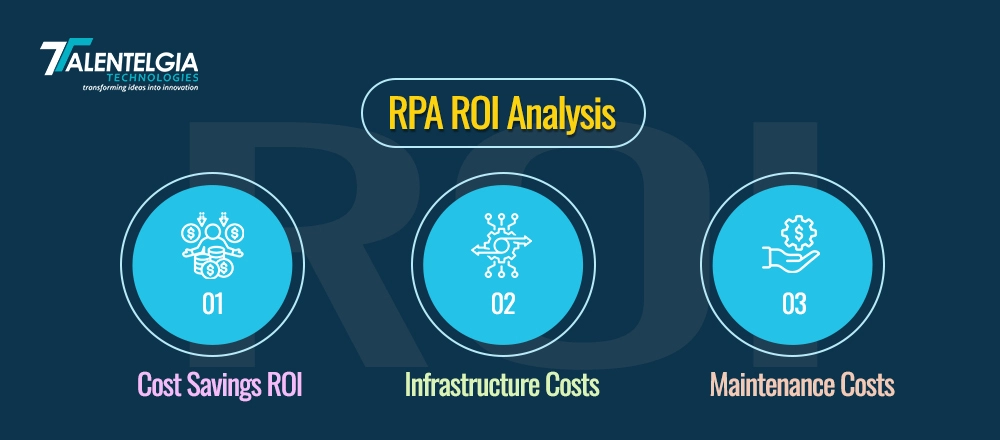
Cost Savings ROI: This part of the ROI analysis focuses on cost reduction or cost avoidance achieved through RPA. It involves calculating savings from reduced labor costs, reduced errors, and reduced operating costs. For example, in RPA, robots will replace human resources for repetitive work, reducing labor time and costs by performing the job more effectively and making fewer mistakes.
Efficiency ROI: Productivity ROI calculates the results of completing tasks faster, reducing work times, and increasing productivity. This guarantees quick turnaround and fast delivery. Due to the ability of automation to process and complete tasks at a faster rate, RPA enables organizations to do more within less time.
Employee Satisfaction ROI: The Employee Satisfaction ROI calculates the effectiveness of RPA in reducing employee burnout, which helps boost morale and increases job satisfaction while making them leave work feeling bad to engage themselves in complex and productive work. This can improve employee retention and workplace relationships.
efficiency & reduced
costs with RPA. Trasnform your operations with our expert
RPA services delivered by a team of 150+
experts with 10+ years of experience.

Example of RPA ROI Calculation:
- Initial Investment Costs:
- Development Costs: $100,000
- Infrastructure Costs: $50,000
- Annual Maintenance Costs: $20,000
- Cost Savings ROI:
- Annual Labor Cost Savings: $200,000
- Annual Savings from Reduced Errors: $30,000
- Annual Operational Expense Savings: $50,000
- Total Annual Cost Savings: $280,000
- Efficiency ROI:
- Faster Task Completion: Reduces processing times by 50%
- Increased Throughput: Allows for 30% more tasks to be completed
- Improved Service Delivery: Reduces turnaround time for services by 40%
- Employee Satisfaction ROI:
- Reduced Burnout: Employees report a 25% decrease in stress levels
- Increased Morale: Employee satisfaction surveys show a 20% improvement
- Higher Job Satisfaction: 15% increase in job satisfaction ratings
Financial Metrics
- Payback Period=Annual Cost Savings/Initial Investment=$280,000/$170,000≈0.61 years (∼7.3 months)
- Net Present Value (NPV): Calculate over 5 years with a discount rate (e.g., 10%).
- Internal Rate of Return (IRR): Calculate to determine the profitability of the RPA investment.
When these metrics are included, a more complete perspective becomes achieved by a business regarding the overall financial and operational benefits that RPA might realize, making it easier to justify space investment and plan scaling automation initiatives.
Also Read: Robotic Process Automation Companies in Saudi Arabia
Conclusion
Robotic Process Automation is set to change the working of businesses through huge cost savings in terms of efficiency and very high satisfaction for employees. As we head towards 2024, RPA in digital transformation becomes more centric. The costs for RPA implantation vary from $4,000 to $20 million, and that involves developments, infrastructures, and maintenance expenses. It's only after one understands these costs and properly analyzes the ROI that a proper decision can be made.
We believe this post will help you understand the key points that impact RPA costs and eventually help best strategize and implement your initiative. Investments finally are hugely in favor due to cost reduction, thereby enhancing productivity as well as employee productivity, making it an integral part of the present business setup.


 Healthcare App Development Services
Healthcare App Development Services
 Real Estate Web Development Services
Real Estate Web Development Services
 E-Commerce App Development Services
E-Commerce App Development Services E-Commerce Web Development Services
E-Commerce Web Development Services Blockchain E-commerce Development Company
Blockchain E-commerce Development Company
 Fintech App Development Services
Fintech App Development Services Fintech Web Development
Fintech Web Development Blockchain Fintech Development Company
Blockchain Fintech Development Company
 E-Learning App Development Services
E-Learning App Development Services
 Restaurant App Development Company
Restaurant App Development Company
 Mobile Game Development Company
Mobile Game Development Company
 Travel App Development Company
Travel App Development Company
 Automotive Web Design
Automotive Web Design
 AI Traffic Management System
AI Traffic Management System
 AI Inventory Management Software
AI Inventory Management Software
 AI Software Development
AI Software Development  AI Development Company
AI Development Company  AI App Development Services
AI App Development Services  ChatGPT integration services
ChatGPT integration services  AI Integration Services
AI Integration Services  Generative AI Development Services
Generative AI Development Services  Natural Language Processing Company
Natural Language Processing Company Machine Learning Development
Machine Learning Development  Machine learning consulting services
Machine learning consulting services  Blockchain Development
Blockchain Development  Blockchain Software Development
Blockchain Software Development  Smart Contract Development Company
Smart Contract Development Company  NFT Marketplace Development Services
NFT Marketplace Development Services  Asset Tokenization Company
Asset Tokenization Company DeFi Wallet Development Company
DeFi Wallet Development Company Mobile App Development
Mobile App Development  IOS App Development
IOS App Development  Android App Development
Android App Development  Cross-Platform App Development
Cross-Platform App Development  Augmented Reality (AR) App Development
Augmented Reality (AR) App Development  Virtual Reality (VR) App Development
Virtual Reality (VR) App Development  Web App Development
Web App Development  SaaS App Development
SaaS App Development Flutter
Flutter  React Native
React Native  Swift (IOS)
Swift (IOS)  Kotlin (Android)
Kotlin (Android)  Mean Stack Development
Mean Stack Development  AngularJS Development
AngularJS Development  MongoDB Development
MongoDB Development  Nodejs Development
Nodejs Development  Database Development
Database Development Ruby on Rails Development
Ruby on Rails Development Expressjs Development
Expressjs Development  Full Stack Development
Full Stack Development  Web Development Services
Web Development Services  Laravel Development
Laravel Development  LAMP Development
LAMP Development  Custom PHP Development
Custom PHP Development  .Net Development
.Net Development  User Experience Design Services
User Experience Design Services  User Interface Design Services
User Interface Design Services  Automated Testing
Automated Testing  Manual Testing
Manual Testing  Digital Marketing Services
Digital Marketing Services 
 Ride-Sharing And Taxi Services
Ride-Sharing And Taxi Services Food Delivery Services
Food Delivery Services Grocery Delivery Services
Grocery Delivery Services Transportation And Logistics
Transportation And Logistics Car Wash App
Car Wash App Home Services App
Home Services App ERP Development Services
ERP Development Services CMS Development Services
CMS Development Services LMS Development
LMS Development CRM Development
CRM Development DevOps Development Services
DevOps Development Services AI Business Solutions
AI Business Solutions AI Cloud Solutions
AI Cloud Solutions AI Chatbot Development
AI Chatbot Development API Development
API Development Blockchain Product Development
Blockchain Product Development Cryptocurrency Wallet Development
Cryptocurrency Wallet Development About Talentelgia
About Talentelgia  Our Team
Our Team  Our Culture
Our Culture 
 Healthcare App Development Services
Healthcare App Development Services Real Estate Web Development Services
Real Estate Web Development Services E-Commerce App Development Services
E-Commerce App Development Services E-Commerce Web Development Services
E-Commerce Web Development Services Blockchain E-commerce
Development Company
Blockchain E-commerce
Development Company Fintech App Development Services
Fintech App Development Services Finance Web Development
Finance Web Development Blockchain Fintech
Development Company
Blockchain Fintech
Development Company E-Learning App Development Services
E-Learning App Development Services Restaurant App Development Company
Restaurant App Development Company Mobile Game Development Company
Mobile Game Development Company Travel App Development Company
Travel App Development Company Automotive Web Design
Automotive Web Design AI Traffic Management System
AI Traffic Management System AI Inventory Management Software
AI Inventory Management Software AI Software Development
AI Software Development AI Development Company
AI Development Company ChatGPT integration services
ChatGPT integration services AI Integration Services
AI Integration Services Machine Learning Development
Machine Learning Development Machine learning consulting services
Machine learning consulting services Blockchain Development
Blockchain Development Blockchain Software Development
Blockchain Software Development Smart contract development company
Smart contract development company NFT marketplace development services
NFT marketplace development services IOS App Development
IOS App Development Android App Development
Android App Development Cross-Platform App Development
Cross-Platform App Development Augmented Reality (AR) App
Development
Augmented Reality (AR) App
Development Virtual Reality (VR) App Development
Virtual Reality (VR) App Development Web App Development
Web App Development Flutter
Flutter React
Native
React
Native Swift
(IOS)
Swift
(IOS) Kotlin (Android)
Kotlin (Android) MEAN Stack Development
MEAN Stack Development AngularJS Development
AngularJS Development MongoDB Development
MongoDB Development Nodejs Development
Nodejs Development Database development services
Database development services Ruby on Rails Development services
Ruby on Rails Development services Expressjs Development
Expressjs Development Full Stack Development
Full Stack Development Web Development Services
Web Development Services Laravel Development
Laravel Development LAMP
Development
LAMP
Development Custom PHP Development
Custom PHP Development User Experience Design Services
User Experience Design Services User Interface Design Services
User Interface Design Services Automated Testing
Automated Testing Manual
Testing
Manual
Testing About Talentelgia
About Talentelgia Our Team
Our Team Our Culture
Our Culture
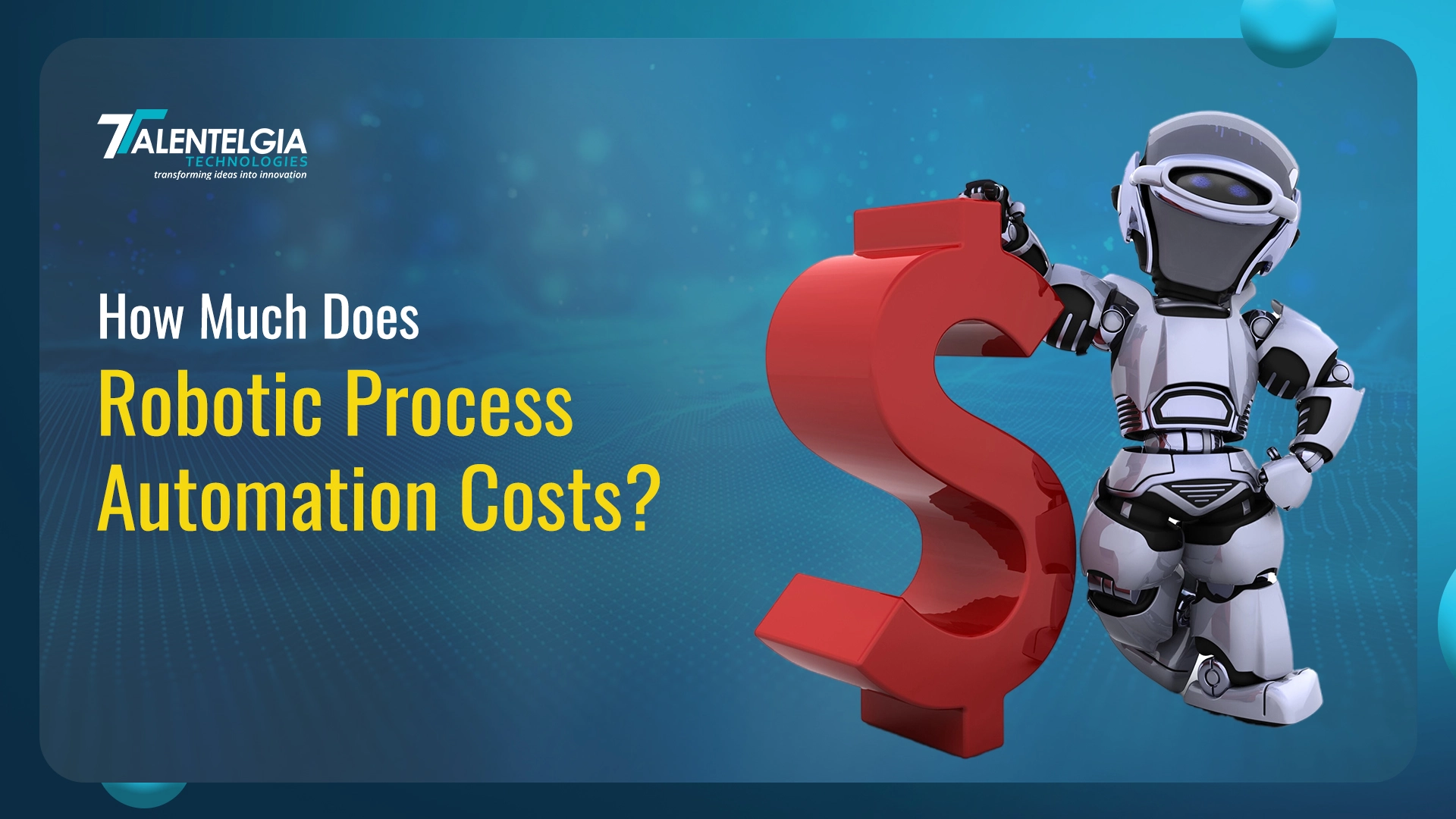





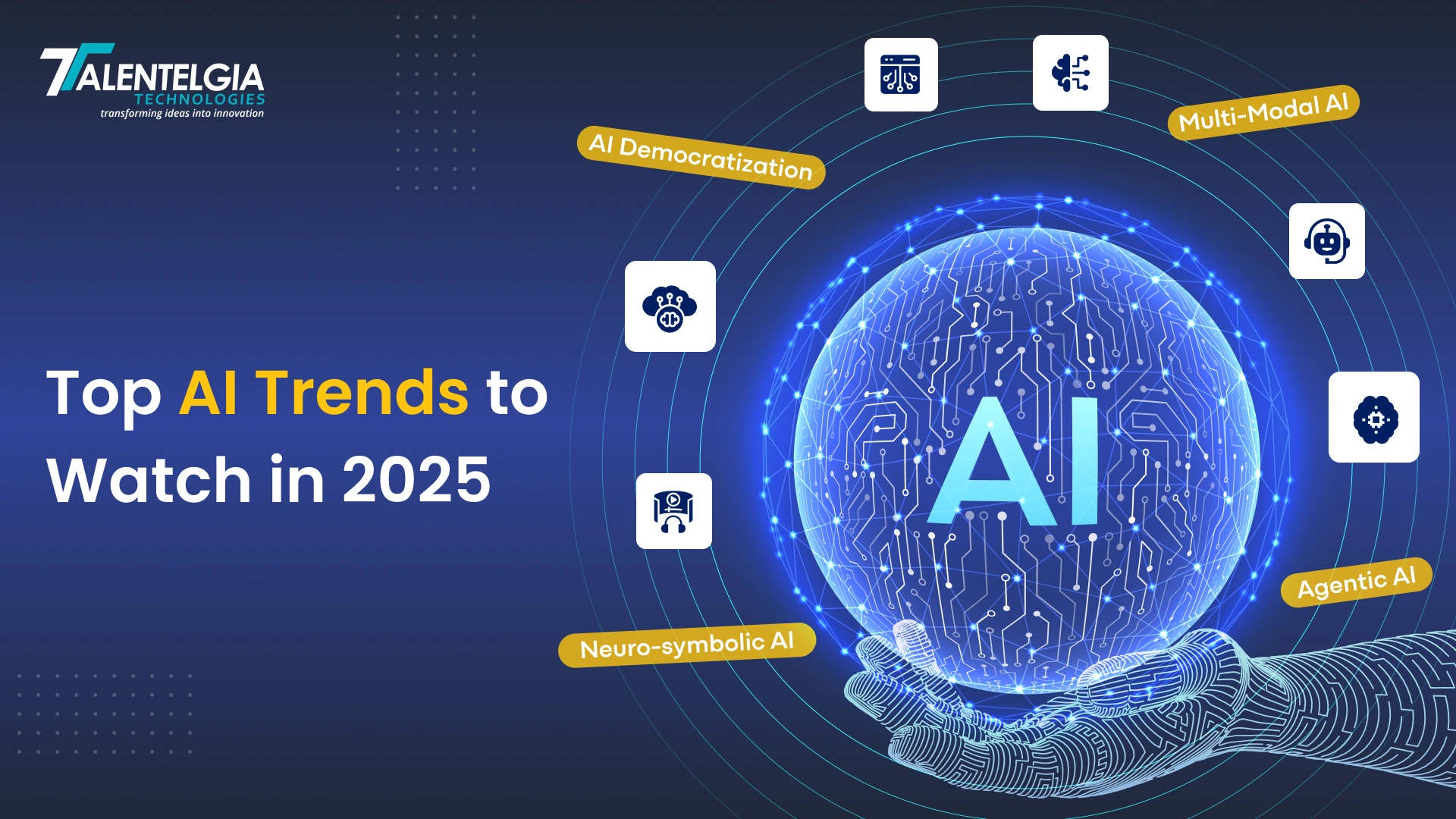











 Write us on:
Write us on:  Business queries:
Business queries:  HR:
HR: 





